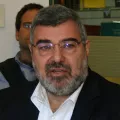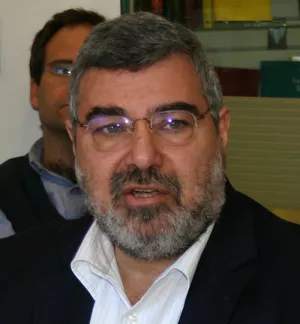
BEIRUT — The nationwide street demonstrations that have now toppled two long-serving and ageing dictators in Algeria and Sudan are particularly poignant, because they occur in two pedigree countries in the modern Arab struggles for freedom and dignity.
Much instant commentary around the world will speak of the arrival of Arab Spring 2.0, following the 2010-11 popular rebellions that achieved mixed results in half a dozen Arab countries; it will also note the armed forces’ continued hold on power, or at least on transitional political mechanisms, hinting that Arab societies are doomed to be ruled by military officers.
Such short-sighted and incomplete views of what is actually going on across most of the Arab region should be juxtaposed against the Algerian and Sudanese people’s reaffirmation of Arab citizens’ longstanding desire for a life of political dignity and socio-economic equity — and their willingness to risk their lives to achieve those rights.
Algeria has long been appreciated across the Arab region for its epic struggle for independence from French colonialism over nearly two centuries, and its support for Arab nationalist and progressive movements since the 1960s. Its decades of military rule reflected similar trends in most Arab lands, while the brief democratic breakthrough of the 1992 elections that were won by local Islamists was quickly and viciously quashed by the armed forces who were supported by Western governments.
Sudan is especially noteworthy because this will be the fourth time since its independence in 1955 that its citizens install a democratic system of government — the first three having been overthrown by military coups. Two other popular uprisings overturned military rulers and briefly restored democratic rule in1964 and 1985.
So far from being sudden, isolated, and delayed revivals of the 2010-11 Arab Uprisings (or “Arab Spring”), Algeria and Sudan’s populist ejections of military rulers more accurately affirm a century-long quest for democracy and human dignity that has defined Arab societies since their late 19th Century stirrings for freedom from European or Ottoman rule.
Algeria and Sudan today should remind us of how deep, wide, and continuous has been the struggle for human rights and political decency across the Arab world, not how erratic or episodic it is. The historical reality is that every conceivable configuration of Arab citizens has struggled day and night, week after week, year after year, from century to century, to achieve the rights they expect as human beings, first, and as citizens of their states, second. They face prison, torture, and death. They are ridiculed and humiliated, marginalized and exiled, beaten, bought, and disappeared — but they persist because they know their own humanity is both invincible and universal.
So they march, write, speak out, challenge, organize, mobilize, vote, go to court, and try every available means to break through the authoritarian chains that bind them to empty political systems, drowning in gutted economies, on the surface of ravaged natural environments, supported by cruel and uncaring Arab and foreign governments.
Everybody beyond a handful of wealthy families and their guards in the power elites struggles in one way or another — sometimes silently, only in their hearts — in this legacy of Arab demands to achieve one’s humanity and rights: individuals, political and professional groups, women’s and student groups, lawyers, street artists, media figures, singers and dancers, local religious and cultural leaders, businessmen and women, high school and university students, local fruit and vegetable sellers, global high-tech magnates, mass movements anchored in religion, ethnicity, or ideology, garbage collectors and school teachers. These and hundreds of other categories of citizens have always challenged their own disdainful authorities, foreign occupiers and invaders, and a global capitalist elite that works closely with ruling governments.
These activist Arab men and women never stopped, even when the foreign television crews went home. They only occasionally laid low when death and imprisonment were no longer useful options to achieve their goals. But they always revived after brief interludes of rest, planning, re-grouping, and re-strategizing, when they sought the most effective and non-destructive way to remove their hollow regimes of old men with guns who routinely go to London, Paris, Washington, Moscow and other faraway capitals to secure praise and more guns.
I feel this viscerally because for the past 50 years, I have personally experienced, reported on, analyzed, and marveled at this legacy of modern Arab struggle for decency, democracy, and dignity, and not just once every seven years when it rears its head and waves to the television crews who drop in from New York, London, and Paris for a few days to marvel at the suddenly restive natives dressed in flowing robes who peacefully but relentlessly demand to live free, or not at all.
The meaning of Algeria and Sudan in this long, uninterrupted legacy of human struggle that has toppled dictatorial rulers recently is in three main causes: citizens who no longer fear their military regimes but challenge them peacefully in the streets; economies that have been turned into wastelands by the regimes that can no longer feed, employ, or house the population, two-thirds of whom have become poor, vulnerable, and desperate; and, the massive security systems the regimes created to protect themselves in the end refused to shoot and kill their own brothers and sisters.
Most honest people in the Arab region understood in their bones that the 2010-11 uprisings were a milestone on a very long and hard road to the three goals that teased — but ultimately eluded — Arab people a century ago, when the modern Arab state system was formed: statehood, sovereignty, and citizenship. Those three prizes, we learned finally, would not come from the generosity of colonial rulers or brutal indigenous autocrats, no matter how many troops they have or how much money they spend.
Statehood, sovereignty, and citizenship emerge only from the persistent toil of honest citizens who respect each other, love their country, and dare to battle homegrown or foreign tyrants to live in freedom and dignity. Arabs have done this for many, many decades, and Algeria and Sudan are the latest examples of this ongoing legacy.
Rami G. Khouri is senior public policy fellow and professor of journalism at the American University of Beirut, and a non-resident senior fellow at the Harvard Kennedy School Middle East Initiative. He can be followed on Twitter @ramikhouri
Copyright ©2019 Rami G. Khouri — distributed by Agence Global
Khouri, Rami. “Algeria, Sudan on the road to Arab statehood, sovereignty, and citizenship.” Agence Global, April 11, 2019


